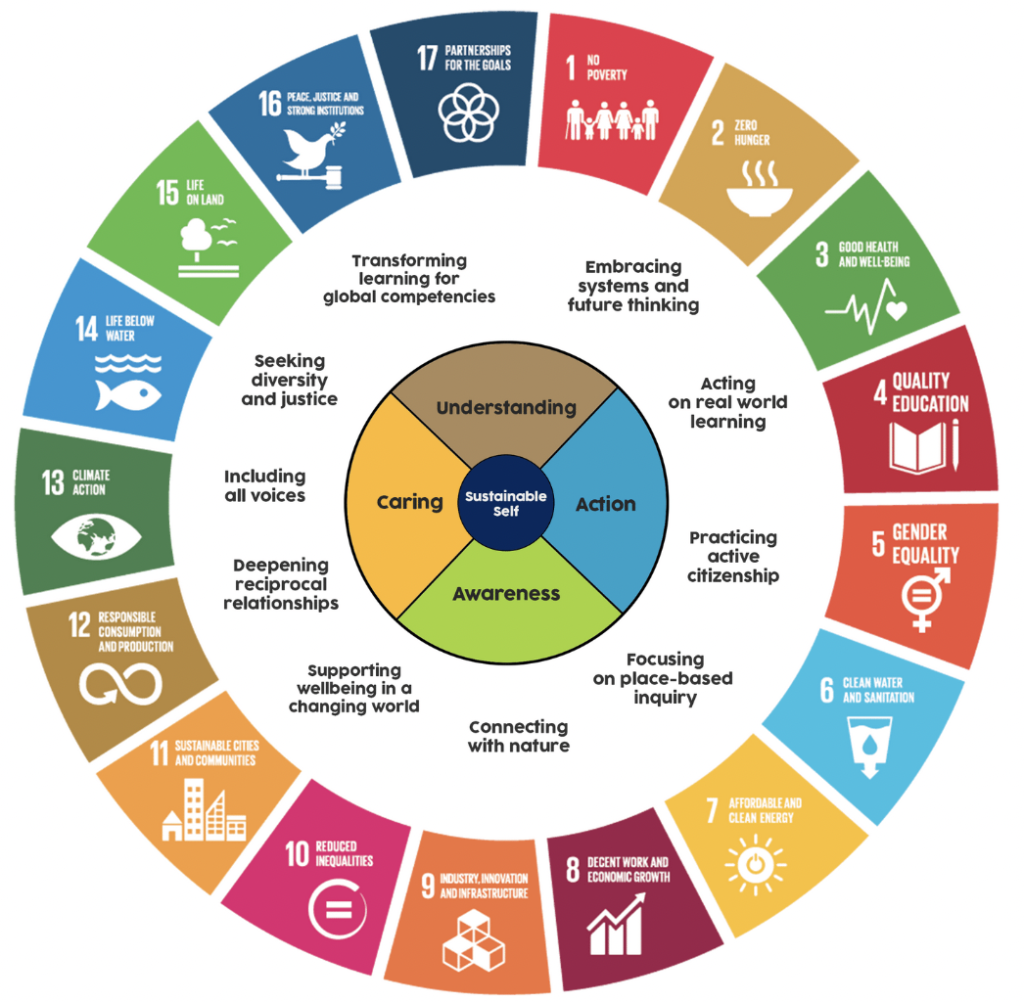THE SUSTAINABLE FUTURE SCHOOL FRAMEWORK
At the centre of the Sustainable Future framework are the human traits that form the values, attitudes and behaviours needed to become a “sustainable self”: a person able to act in the world with skill, tenacity and wellbeing.
Awareness:
To find their place in a changing world children need to know the place they live. This includes the nearby natural, built and human community that sustains them each day: its history, its cultures, its concerns and opportunities.
Caring
Learning in the local community creates a reciprocal relationship with the land and the people who partner in their learning. When a relationship is formed there is energy and motivation to act.
Understanding
From care comes curiosity for learning. They can see the relevance of their knowledge and can leverage the knowledge, tools and thinking skills needed to adapt, create and innovate effectively.
Action
Acting on real world problems at school lets students find purpose in what they do and the confidence to continue as active citizens throughout their lives.
10 Elements:
Description:
Encourage, through place-based inquiry, a shared respect and responsibility for learning, for each other, and for the land.
Learn more:
“Place-based education is learning that is rooted in what is local – the unique history, environment, culture, economy, literature, and art of a particular place” (Rural Community Trust ). Connecting to a sense of belonging, ‘place’ has social and emotional value to each of us. At the heart of place-based learning is the local community and environment, where the curriculum comes to life, providing meaningful context to literacy, numeracy, science, the arts and other curricular expectations. Focused on hands-on, real-world experiences, students develop strong ties to the natural world and the local community, creating a deep commitment to being active, contributing citizens.
A sustainable future school is rooted in the local context. Learners enter into a relationship with the land, a sense of belonging and stewardship towards it. School communities model practices of sustainability in all facilities including buildings
and green spaces.
Explore More:
Description:
Connect all learners to the wonder and awe of the natural world, our interdependence with it and the skills to protect it.
Learn More:
Our finite natural world provides all that creates life including our air, water and food. We are completely dependent on its sustainability. For humans, there are many other positive benefits especially the cognitive, physical and mental wellbeing gained through connection to the environment.
We are inspired to inquire, create and innovate with Nature as our first and best teacher.Both people and the environment benefit from connection. “When people are disconnected from nature, they aren’t motivated to work on wicked problems like climate change. We’re losing the environments that contribute to our flourishing,”. “The key question is, How do we help people feel connected to nature so we’re motivated to protect the places that will help us thrive?”
A sustainable future school fosters a deep understanding of our interdependence with the natural world.
Explore More:
Description:
Develop and sustain school and community practices by collaborating with others through ongoing communication. Schools model interdependent, complementary, relationships that are connected, balanced, and mutually beneficial. The key to creating reciprocal relationships is a respect and appreciation for the common goal.
Learn More:
Schools are part of social systems supporting and interacting with the local community which builds positive relationships within and beyond the school. This includes communicating and exchanging ideas transparently in many ways including interviews, focus groups and surveys committees, public meetings and knowledge building forums — using in-person, digital and social media tools.
A sustainable future school works together to evolve practices within and beyond the school and create opportunities for deepening connection by including diverse perspectives, coordinating actions, sharing resources and building consensus.
Explore More:
The Role of Reciprocal Relationships in Creating a Strong School Community
Description:
Maintaining physical and mental wellbeing builds resilience, emotional strength and self-care in the face of complex challenges.
Learn More:
It is important to understand the cognitive, emotional and social impacts change has on individuals and on human behaviour. What do each of us care about and why? This question brings self awareness about our mental models and the values that shape our perspectives and actions. Developing self-awareness and finding common ground and compassion for others leads to sustainable action.The influence of social norms and values on individual and community behaviour helps us understand changing habits and attitudes, consumer choices and civic action.
Critical to well-being are selfcare and self-regulation strategies, including building positive relationships and time spent in Nature. These offer protective supports during times of change and help build resilience.
A sustainable future school supports wellbeing as core to optimal personal growth and positive personal and social action
Explore More:
Description:
Foster inclusive, collaborative and equity-centered leadership in schools and community partnerships. Everyone, students, teachers, parents and local citizens, has a voice.
Learn more:
Promoting a climate of inclusion where students work together to learn to ask good questions and listen effectively, scaffolds deep and meaningful experiences for all. Connecting beyond the limits of the classroom, to form partnerships within the community with caring individuals and organizations, who can provide resources and mentorship, bring learning into the real world. In real-world experiences the values, opinions, beliefs, perspectives and cultural backgrounds are considered, included, listened to and acted upon in the decision-making processes.
A sustainable future school creates a common learning environment, where students of all backgrounds and abilities work together under the guidance of leaders, who promote equity and excellence for all, are the standard practice.
Explore More:
Description:
Respect for alternative perspectives, diverse ideas and seeking to understand and innovate together in the pursuit of social and environmental justice.
Learn more:
“Considering alternative perspectives exposes students to different ways of looking at issues, solutions, strategies, experiences, worldviews and ways of knowing, in the process of solving problems, forming opinions, clarifying values and taking an informed position” (DOTS). Understanding that everything in the natural and made world is connected, we must also understand that we, as humans, impact the world around us. A fair and equal society, in which every individual, regardless of their background matters, is entitled to a clean and healthy environment and opportunities to thrive.
A sustainable future school provides the knowledge, tools and inspiration needed to develop a socially-aware citizen who can contribute to a more positive, collective future for all.
Explore More:
Description:
Using systems thinking tools, students engage with multifaceted questions leading to sustainable solutions which will yield benefits today and for future generations. Including the future as an important voice in all decision-making helps us to “think long” and avoid the problems caused by short term thinking. Krznaric- The tug of war for time.
This also reflects Indigenous teaching about respect for the land and people alive today now and in the future. The Seventh Generation Principle is based on an ancient Haudenosaunee (Iroquois)* philosophy that the decisions we make today should result in a sustainable world seven generations into the future.
Learn More:
Systems thinking is a transformational approach to learning, problem-solving and understanding the world. It’s about seeing life in motion, recognizing that the big picture is rarely static, but almost always a web of factors that interact to create patterns and change over time.
A sustainable future school uses thinking tools to understand how systems and issues are complex and interconnected and how solutions can benefit those living today and in the future.
Explore More:
Description:
“Building on strong foundations of numeracy and literacy, global competencies is a pan-Canadian effort to prepare students for a complex and unpredictable future with rapidly changing political, social, economic, technological, and ecological landscapes”. Canada is a large and diverse country therefore each province and territory will adapt these competencies to reflect their individual populations and cultures. (CMEC)
The six global competencies, as identified by the Pan Canadian Council of Ministers of Education are as follows:
- critical thinking and problem solving
- innovation, creativity, and entrepreneurship
- learning to learn/self-awareness and self-direction
- collaboration
- communication
- global citizenship and sustainability
Learn More:
“There is growing recognition that global competencies promote deeper learning by equipping students with the necessary tools to adapt to diverse situations and become lifelong learners.” (CMEC)
Work collaboratively, think critically to solve problems, develop creativity, innovation and an entrepreneurial mindset. Demonstrate self-awareness, self-direction and self-regulation as keystones for learning to learn (grit, tenacity, perseverance, resilience, reliability and honesty), to identify opportunities and overcome obstacles and exercise responsible global citizenship, using clear communication skills.
In a technology-driven world culture, learners need the tools and experiences to discern and navigate information, and act responsibly as consumers, creators and communicators of digital content.
A sustainable future school approaches complex issues and problems proficiently, turns ideas into action, builds strong character traits that promote diverse thinking and understanding of what it means to be a global citizen.
Explore More:
Pan Canadian Systems-Level Framework on Global Competenciesfor
Description:
Real world learning addresses concepts, problems and issues that are similar to ones students have encountered or are likely to encounter in life. This brings relevance, complexity and motivation to their learning. (DOTS pg 43)
Learn More:
Acting on what students learn in school provides purpose to their learning and strengthens their ability to form relationships. They gain experience about how communities work. “Education without action is like food without exercise,” says veteran educator Terry Godwaldt, founder of the Centre for Global Education in Edmonton, Alberta (Edutopia). Acting on real-world learning gives them the opportunity to overcome challenges with support and build the self-confidence that grows from contributing positively to an issue important to them.
A sustainable future school participates in real world applications of their learning and practices problem-solving strategies authentically as active members of their communities.
Explore More:
Description:
[Through] Community experiences connected to their learning, inspire the values and build the skills for active citizenship.
Learn More:
Within the core values of active citizenship are the rights and responsibilities that go with community. Along with these rights and responsibilities, is the recognition of inequality and the desire to advocate for change.
A sustainable future school develops the knowledge, skills, attitudes and values to learn to exercise and engage in activities that promote freedom of expression, thought and belief, and contribute to a fair and just community through engagement and action.
Explore More:
With Support from:
![]()


